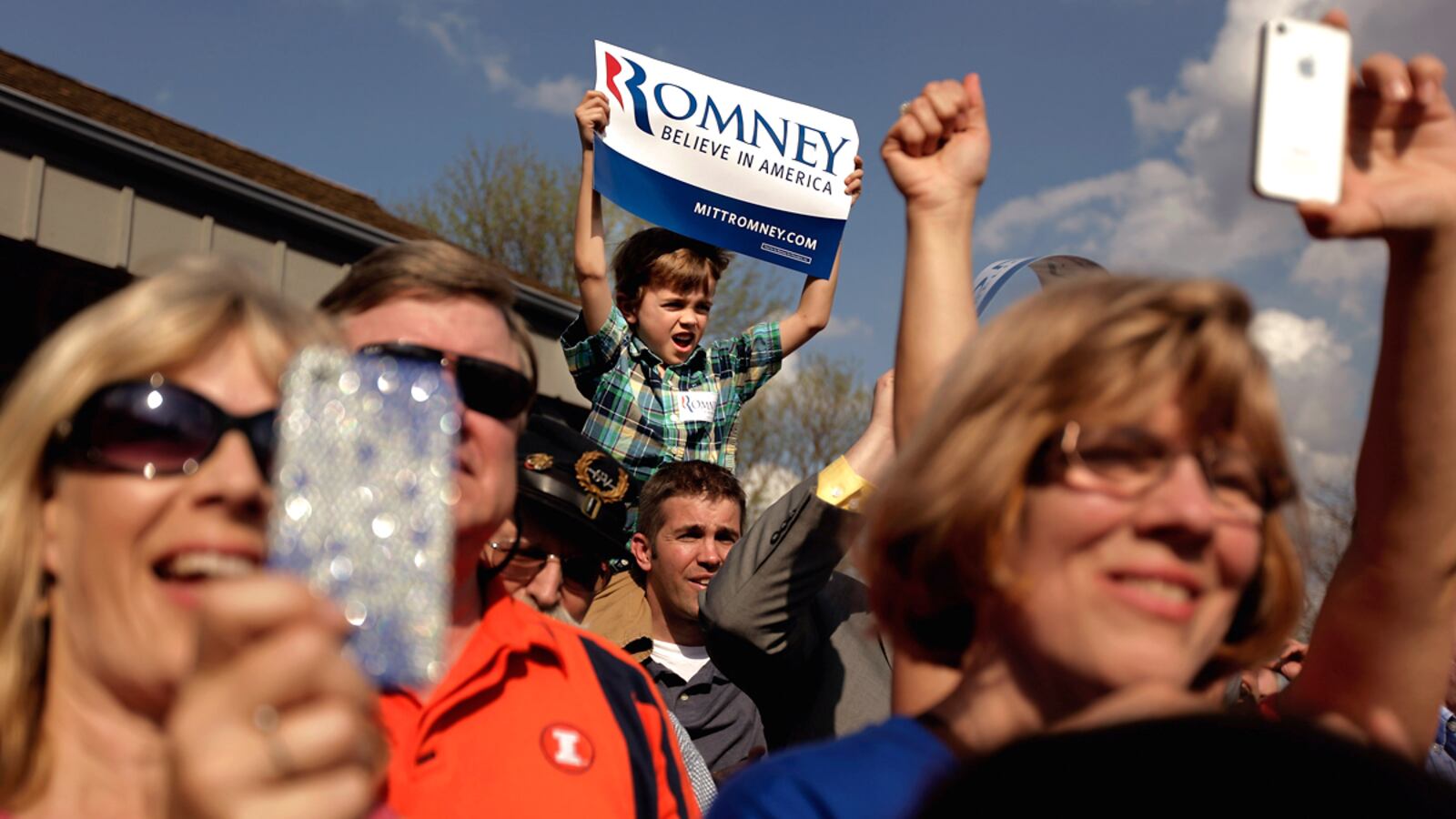After a long primary season, Mitt Romney begins his contest with Barack Obama without having attracted any notable black endorsers, surrogates, or high-ranking campaign staffers.

So far, Romney’s highest-profile endorsement from a black supporter might be Aubrey Fenton, a former Burlington County New Jersey freeholder, and there are no African-Americans in the top ranks of the campaign. The two black Republicans in Congress, Tim Scott and Allan West, still haven’t endorsed the party’s nominee-apparent. The Romney campaign, which often touts its support from Hispanics, women, and other groups, did not provide any information about black supporters or staffers in response to several requests from The Daily Beast.
Romney, running against the first black president, has no chance of winning most African-American voters. But neglecting to court them at all sends the wrong message to swing voters, said political players and observers. Romney’s problem, they said, isn’t that blacks aren’t buying his message but that he hasn’t bothered to sell it to them.
Democratic consultants compared Romney's outreach unfavorably with George W. Bush’s efforts. Tad Devine recalled Bush’s 2000 campaign, which “conspicuously did a lot of outreach to the African-American community. Even thought it didn’t affect the numbers,” he said, “it did have a very favorable impact on the campaign,” allowing Bush “to portray himself as more moderate—a conservative, but a compassionate conservative.” But Romney, said Devine, has offered “no outreach, no presence in his advertising, [save] a couple of frames in his very first ads.” Steve McMahon, a Democrat consultant, said that a “in a close election, this can be the difference between winning and losing,” pointing to George W. Bush’s 2004 margin of victory in Ohio, where he clinched a second term by upping his support among the state's African-American voters by just 5 percentage points.
Politicos of all ideological bents stressed that Romney was in no way prejudiced against African-Americans, but also agreed that his campaign had paid little attention to the group. As Lee Siegel memorably described the candidate who once tried to appeal to a group of black kids at a Martin Luther King Jr. Day parade by singing the refrain of “Who Let the Dogs Out,” "Mitt Romney is the whitest white man to run for president in recent memory."
Since Richard Nixon’s Southern strategy severed the group’s remaining ties with the party of Lincoln, Democrats have dominated the black vote to the point where exit polls in key primary states like Iowa and New Hampshire registered 0% African-American participation. In Mississippi, the most heavily African-American state in the country, only 2 percent of GOP primary voters were black.
But in some ways, his campaign’s problem seems particular to Romney, not his party. An extensive list of “key supporters” of his 2008 presidential bid included groups of women, Hispanics, and Asian supporters, but not African-Americans. In contrast, his Republican rivals this year could all point to noteworthy black supporters or staffers. Newt Gingrich has former Rep. J.C. Watts and former presidential candidate Herman Cain on his “conservative Dream Team.” Ron Paul has an African-American spokesman, Gary Howard. Even Santorum had O'Neal Dozier, a controversial pastor and honorary chair of his Florida campaign, and Kabeer Gbaja-Biamila, the former Packers defensive end who endorsed him in Wisconsin.
“It’s just plain stupid," said demographer Joel Kotkin of the campaign's apparent neglect of black voters. “This is clearly a blind spot, perhaps because Romney’s generation of Mormons grew up in an all-white world,” he said, comparing it to "Obama’s preference for university professors over businessmen.”
In what read like a preemptive defense, the reliably Romney-friendly Drudge Report linked to a story Monday with the headline “Report: 'Stunning lack of diversity' in Obama's reelection campaign ... ”That story was based largely on one picture of overwhelmingly young and white Obama campaign staffers at his Chicago headquarters that was originally posted on the president’s Tumblr page. "I just saw a piece on Drudge [that] looked at the Obama campaign and it seems like neither [campaign] has diversity," said Alphonso Jackson, the former secretary of Housing and Urban Development in the Bush administration.
But Obama has less reason for concern on this front; he is the first black president, and as the first black major-party candidate he won 96 percent of the black vote in 2008. Romney, on the other hand, has already had to respond to questions about his prominent role in the Church of Jesus Christ of Latter-Day Saints, which mostly excluded black members until 1978, when he was 30 years old. While he’s tried to steer clear of discussing his Mormon faith since delivering a 2007 speech about it, Romney has since said that he played no role in the church’s earlier discriminatory policy and that he "literally wept" tears of joy on hearing the news that it had been changed.
With the lines drawn for November, Republicans tended to accentuate the positive. Republican strategist Rich Galen said outreach efforts aimed at black voters “might well influence nonaligned voters, white and black” in key battlegrounds like the suburbs of Philadelphia, and that he expected the Romney campaign to ramp up its outreach efforts in the months leading up to the party's convention in August. Jackson complained that while both parties' campaigns have trouble drawing volunteers of color, "we never say anything about Democrats" with diversity issues. He called Romney “as fair-minded as God makes a human being,” and predicted his administration would be as diverse as those of Presidents Clinton and Bush. "They’re going to reach out," said Jackson. "This is 2012, and it’s foolish to think that … any candidate would be insensitive" to black voters. Cain and West both argued that Romney would do best with black voters by offering a color-blind conservative message, rather than aiming an appeal at the group.
Armstrong Williams, a prominent African-American conservative commentator, was more critical, blaming Romney’s campaign team for failing to cultivate black supporters and speculating that the candidate had been led astray by his advisers. With “the right advice, right backbone, [and the] gall to be audacious,” Williams predicted Romney could exceed 15 percent of the black vote, which would be four times the share John McCain garnered running against Obama in 2008.
So far, Romney has given little indication he’ll make that push.
“African-Americans have been hit particularly hard by President Obama's failed economic policies," said Romney spokesperson Andrea Saul in a statement. "On President Obama's watch, 14 percent of African-Americans are unemployed. Governor Romney talks about these issues daily—the economy, gas prices, unemployment, and the household budget squeeze that Americans are faced with—and has a plan to get the country back on track."
"Remember," said Kotkin, "Romney grew up in affluent, white Michigan in the 1950s, came of age among fellow white Mormons, and he was governor of Massachusetts, which is not exactly diversity central, either. He’s 65: how many black people do you think he grew up with? How many were getting M.B.A.s at Harvard while he was there? Or were at Bain?"
"Romney just has these blind spots that don’t necessarily make him a bad guy. It just is who he is.”







